Amid profit windfall: Case for greater financial access remains weak
Reluctance remains on part of banks, Pakistanis; digital revolution provides hope
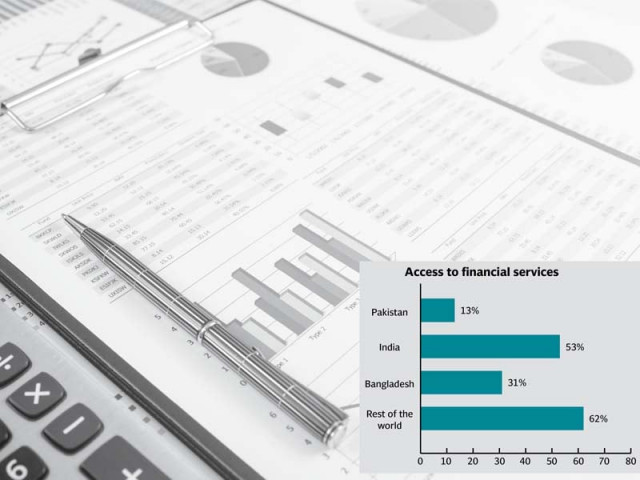
Reluctance remains on part of banks, Pakistanis; digital revolution provides hope. DESIGN: NABEEL KHAN
As the year draws to a close and local banks post record profits, it is interesting to note that someone living in Sub Saharan Africa – a region that includes the poorest, least developed countries in the world – is over three times more likely to have a bank account than a Pakistani.
Indeed, even after including mobile accounts, only about 13% of Pakistanis have access to financial services. Compare that to India (53%), Bangladesh (31%) and the rest of the world (62%) and one has to wonder why we are such laggards.
Financial sector: Lazy banking, huge earnings
We also have to wonder exactly why financial access is important. After all, given the increasingly dismal shape of our national accounts, resources are limited and instead of opening bank accounts, it may make more sense to focus on health, education and infrastructure.
The tale of Rafiq
To understand why that would be a mistake, we can look at Rafiq Pervez – a farmer with three acres of land outside Mailsi, a small city in Punjab.
Rafiq has two sons, three daughters and is taking care of his incapacitated mother. Like most farmers, his income is not just cyclical, but also subject to all sorts of uncertainties. Accordingly, he uses a combination of personal savings and loans from friends, shopkeepers and moneylenders to manage a relatively stable income – something economists refer to as consumption smoothing.
Daily expense aside, Rafiq also needs to save for contingency planning - for when he is too old to plough the fields, or when his mother dies, or his daughters get married. These are largely anticipated expenses that are often managed using a combination of savings and investments in rotating savings and credit association (ROSCA)-like credit instruments, such as committees.
Rafiq also incurs some troublesome unanticipated expenditures — family members unexpectedly fall sick; floods wipe out crops for a few seasons, some capital equipment breaks down. These emergency losses are harder to sustain and often leave entire generations under the onerous burden of extremely high interest, loans.
Meanwhile, Rafiq’s industrious wife Shazia has managed to develop a low cost, smoke free stove to make life easier in the kitchen. She knows she can sell these machines for a decent profit in the Mailsi market. However, given her financial situation, she is unable to save or otherwise obtain the money to cover startup costs. As such, not only does the Pervez family remain trapped in poverty, but a potentially profitable small business also remains unexploited.
So while financial access does not make income cycles more predictable or health problems less likely, it is a powerful enabling factor that makes it easier to handle uncertainty.
In doing so it not only enables contingency planning and efficient credit allocation but it also enables investments in education and wealth creation, which through a multiplier effect, boost the entire economy.
Access to finance would enable Rafiq to invest in better quality seed and equipment, while Shazia could borrow enough money, at a reasonable rate, to operationalise her business idea.
The Pervez family would not only be able to manage risk and absorb financial shocks but they may even be able to lift themselves out of poverty and help others along the way.
The reluctance
Why then, despite a fairly supportive regulatory framework, do less than one in ten Pakistanis hold a bank account?
The answer has much more to do with the economics of banking than it does with specific demographics. Banks simply don’t find it profitable to extend services to low income or rural customers.
Given the small ticket size, lack of information on borrowers and high transaction costs, it makes more sense to stay away. Plus, as a senior banker recently put it, “we don’t need to.” Large Pakistani banks with the muscle to go into smaller segments are soaking up enough cash from traditional, concentrated markets.
Deposits continue to grow effortlessly. Profits increase at record-breaking pace. There is no need to do more. Even more so on the asset side, where given a comfortable list of corporate clients and heavy reliance on riskless government paper, banks are even less willing to look downstream.
On the demand side, even when government mandated branches exist outside urban centers they have to navigate significant psychological barriers.
A vast majority of the unbanked in Pakistan stays away because they believe that banks are expensive and are not meant “for them”. Plus, they are unable to meet the increasingly cumbersome requirements for documentation and paperwork. No surprise then that Pakistan has some of the most dismal financial access numbers in the world.
Yet, people like Rafiq are not doomed to perpetual financial exclusion. There is hope. Not in the traditional banking sector but in the digital revolution that is already beginning to reconfigure the industry.
Corporate results: MCB Bank’s profit surges 43.5%
Amazon, Netflix and Expedia decimated traditional bookstores, video rentals, and travel. Similarly, fintech platforms using a powerful combination of mobile and cloud computing, decentralised networks and data analytics are poised to redefine banking. In doing so they will not only take out increasing chunks of the banking industry, but they will also enable mass financial access and transform millions of lives. So the future looks bright. We just need to be prepared.
The writer holds a doctorate from the Harvard Business School, has worked as the head of strategy at a commercial bank and as a management
consultant with McKinsey & Co. in New York
Published in The Express Tribune, December 14th, 2015.
Like Business on Facebook, follow @TribuneBiz on Twitter to stay informed and join in the conversation.



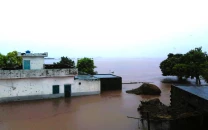
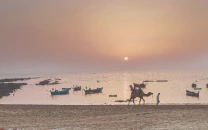
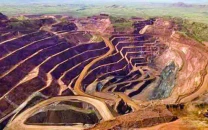
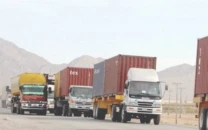












COMMENTS
Comments are moderated and generally will be posted if they are on-topic and not abusive.
For more information, please see our Comments FAQ